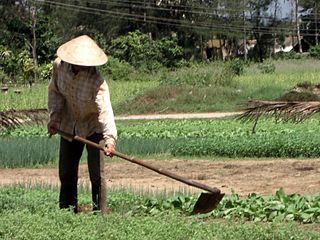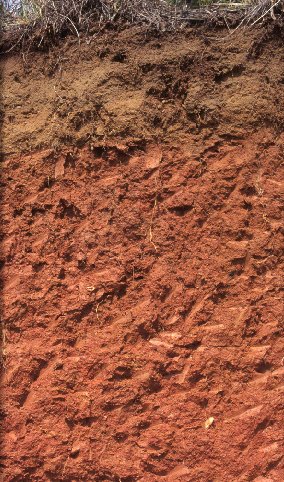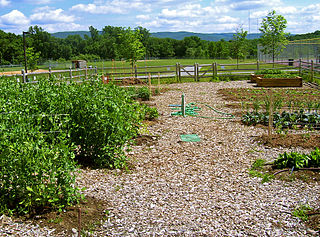
Permaculture is an approach to land management and settlement design that adopts arrangements observed in flourishing natural ecosystems. It includes a set of design principles derived using whole-systems thinking. It applies these principles in fields such as regenerative agriculture, town planning, rewilding, and community resilience. Permaculture originally came from "permanent agriculture", but was later adjusted to mean "permanent culture", incorporating social aspects. The term was coined in 1978 by Bill Mollison and David Holmgren, who formulated the concept in opposition to modern industrialized methods instead adopting a more traditional or "natural" approach to agriculture.
No-dig gardening is a non-cultivation method used by some organic gardeners. The origins of no-dig gardening are unclear, and may be based on pre-industrial or nineteenth-century farming techniques. Masanobu Fukuoka started his pioneering research work in this domain in 1938, and began publishing in the 1970s his Fukuokan philosophy of "do-nothing farming" or natural farming, which is now acknowledged by some as the tap root of the permaculture movement. Two pioneers of the method in the twentieth century included F. C. King, Head Gardener at Levens Hall, South Westmorland, in the Lake District of England, who wrote the book "Is Digging Necessary?" in 1946 and a gardener from Middlecliffe in the UK, A. Guest, who in 1948 published the book "Gardening Without Digging". The work of these gardeners was supported by the Good Gardeners Association in the UK. No-dig gardening was also promoted by Australian Esther Deans in the 1970s, and American gardener Ruth Stout advocated a "permanent" garden mulching technique in Gardening Without Work and no-dig methods in the 1950s and 1960s.

Vermicompost (vermi-compost) is the product of the decomposition process using various species of worms, usually red wigglers, white worms, and other earthworms, to create a mixture of decomposing vegetable or food waste, bedding materials, and vermicast. This process is called vermicomposting, while the rearing of worms for this purpose is called vermiculture.
Vegan organicagriculture is the organic production of food and other crops with minimal animal inputs. Vegan organic agriculture is the organic form of animal-free agriculture.

A hoe is an ancient and versatile agricultural and horticultural hand tool used to shape soil, remove weeds, clear soil, and harvest root crops. Shaping the soil includes piling soil around the base of plants (hilling), digging narrow furrows (drills) and shallow trenches for planting seeds or bulbs. Weeding with a hoe includes agitating the surface of the soil or cutting foliage from roots, and clearing the soil of old roots and crop residues. Hoes for digging and moving soil are used to harvest root crops such as potatoes.

A mulch is a layer of material applied to the surface of soil. Reasons for applying mulch include conservation of soil moisture, improving fertility and health of the soil, reducing weed growth and enhancing the visual appeal of the area.
In soil science, agriculture and gardening, hardpan or soil pan is a dense layer of soil, usually found below the uppermost topsoil layer. There are different types of hardpan, all sharing the general characteristic of being a distinct soil layer that is largely impervious to water. Some hardpans are formed by deposits in the soil that fuse and bind the soil particles. These deposits can range from dissolved silica to matrices formed from iron oxides and calcium carbonate. Others are man-made, such as hardpan formed by compaction from repeated plowing, particularly with moldboard plows, or by heavy traffic or pollution.
Biointensive agriculture is an organic agricultural system that focuses on achieving maximum yields from a minimum area of land, while simultaneously increasing biodiversity and sustaining the fertility of the soil. The goal of the method is long term sustainability on a closed system basis. It is particularly effective for backyard gardeners and smallholder farmers in developing countries, and also has been used successfully on small-scale commercial farms.

Ultisols, commonly known as red clay soils, are one of twelve soil orders in the United States Department of Agriculture soil taxonomy. The word "Ultisol" is derived from "ultimate", because Ultisols were seen as the ultimate product of continuous weathering of minerals in a humid, temperate climate without new soil formation via glaciation. They are defined as mineral soils which contain no calcareous material anywhere within the soil, have less than 10% weatherable minerals in the extreme top layer of soil, and have less than 35% base saturation throughout the soil. Ultisols occur in humid temperate or tropical regions. While the term is usually applied to the red clay soils of the Southern United States, Ultisols are also found in regions of Africa, Asia, and South America.

Organic horticulture is the science and art of growing fruits, vegetables, flowers, or ornamental plants by following the essential principles of organic agriculture in soil building and conservation, pest management, and heirloom variety preservation.
In permaculture, sheet mulching is an agricultural no-dig gardening technique that attempts to mimic the natural soil-building process in forests. When deployed properly and in combination with other permaculture principles, it can generate healthy, productive, and low maintenance ecosystems.
Denver Urban Gardens (DUG) is a non-profit organization that supports community gardens in Denver, Colorado in the United States.

A keyhole garden is a two-meter-wide circular raised garden with a keyhole-shaped indentation on one side. The indentation allows gardeners to add uncooked vegetable scraps, greywater, and manure into a composting basket that sits in the center of the bed. In this way, composting materials can be added to the basket throughout the growing season to provide nutrients for the plants. The upper layer of soil is hilled up against the center basket so the soil slopes gently down from the center to the sides. Most keyhole gardens rise about one meter above the ground and have walls made of stone. The stone wall not only gives the garden its form, but helps trap moisture within the bed. Keyhole gardens originated in Lesotho and are well adapted to dry arid lands and deserts. In Africa, they are positioned close to the kitchen and used to raise leafy greens such as lettuce, kale, and spinach; herbs; and root crops such as onions, garlic, carrots, and beets. Keyhole gardens are ideal for intensive planting, a technique in which plants are placed close together to maximize production. Plants with wide-reaching root systems such as tomatoes and zucchini may not perform well in a keyhole garden.

Xeriscaping is the process of landscaping, or gardening, that reduces or eliminates the need for irrigation. It is promoted in regions that do not have accessible, plentiful, or reliable supplies of fresh water and has gained acceptance in other regions as access to irrigation water has become limited, though it is not limited to such climates. Xeriscaping may be an alternative to various types of traditional gardening.
French intensive gardening also known as raised bed, wide bed, or French market gardening is a method of gardening in which plants are grown within a smaller space and with higher yields than other traditional gardening methods. The main principles for success are often listed as soil improvement, raised beds, close spacing, companion planting, succession planting and crop rotation. Originating in France, the practice is very popular among urban gardeners and small for profit farming operations.
There are many ways to garden in restricted spaces. Often a small or limited space is an issue in growing and cultivating plants. Restricted space gardens can be located on small lawns, balconies, patios, porches, rooftops, inside the home, or in any other available place. Gardening in small places can be applied to edible or floral plants. Growing food has many benefits including saving money; healthier, fresher, and better tasting food; knowledge of pesticide and fertilizer exposure. Gardening is a good form of exercise and has been proven to be therapeutic.

Hügelkultur, literally mound bed or mound culture is a horticultural technique where a mound constructed from decaying wood debris and other compostable biomass plant materials is later planted as a raised bed. Adopted by permaculture advocates, it is suggested the technique helps to improve soil fertility, water retention, and soil warming, thus benefitting plants grown on or near such mounds.

Digging, also referred to as excavation, is the process of using some implement such as claws, hands, manual tools or heavy equipment, to remove material from a solid surface, usually soil, sand or rock on the surface of Earth. Digging is actually the combination of two processes, the first being the breaking or cutting of the surface, and the second being the removal and relocation of the material found there. In a simple digging situation, this may be accomplished in a single motion, with the digging implement being used to break the surface and immediately fling the material away from the hole or other structure being dug.
Home composting is the process of using household waste to make compost at home. Composting is the biological decomposition of organic waste by recycling food and other organic materials into compost. Home composting can be practiced within households for various environmental advantages, such as increasing soil fertility, reduce landfill and methane contribution, and limit food waste.
Charles Dowding is an English horticulturalist and author who has pioneered modern no dig and organic soil management since 1983.










